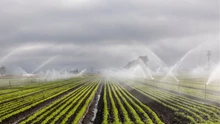
Climate change is no longer a distant threat looming on the horizon; it's a reality that's making its presence felt in our daily lives, even in our peaceful gardens. For home gardeners, adapting to erratic weather patterns and environmental shifts has become a necessary part of nurturing their green spaces. As we witness earlier blooms, rising temperatures, and unpredictable growing seasons, it's crucial to understand how climate change affects our gardens and what steps we can take to mitigate its impact.
One of the most noticeable effects of climate change on gardens is the disruption of natural cycles. Plants, in an attempt to adapt to the changing climate, may flower earlier than usual, only to be caught off guard by late frosts. Similarly, species that rely on specific chill hours to fruit may struggle to synchronize their flowering times with pollinators, leading to decreased fruit yields. This mismatch between flowering times and pollinator activity poses a significant threat to plant reproduction and biodiversity in our gardens.
Moreover, the warmer temperatures and excessive heat associated with climate change create an environment conducive to the spread of diseases in gardens. Fungal infections, pests, and pathogens thrive in these conditions, posing a constant threat to plant health. Additionally, invasive plant species find favourable conditions to spread and dominate garden area, requiring gardeners to invest more time and effort into weed management.
Another challenge exacerbated by climate change is the inconsistency in water patterns. Droughts, followed by intense rainfall or extended dry spells, disrupt the natural water cycle, making it challenging to maintain optimal soil moisture levels in gardens. As water becomes insufficient, gardeners must find innovative ways to conserve and manage water resources efficiently.
However, amid these challenges, gardeners have a chance to take on a new role in the battle against climate change. While we may not single-handedly halt the progression of climate change, there are steps we can take to minimize our environmental footprint and create resilient garden ecosystems.
One such measure is to adopt water-saving practices in the garden. Utilizing techniques such as mulching to retain moisture, installing rain containers to collect water, and implementing drip irrigation systems can significantly reduce water consumption and promote water efficiency.
Furthermore, increasing composting efforts can help mitigate climate change while enhancing soil health. By diverting kitchen and garden waste from landfills and converting it into nutrient-rich compost, gardeners not only reduce methane emissions but also enrich their soil with organic matter, improving its structure and fertility.
Overall, climate change poses significant challenges to gardeners worldwide, requiring them to adapt their practices to the changing environmental conditions. we can nurture resilient garden ecosystems that thrive despite the challenges posed by a changing climate by understanding the impacts of climate change on gardens and implementing sustainable gardening practices.













